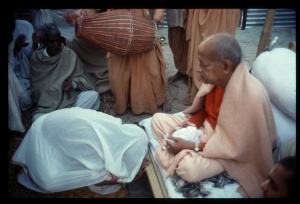CC Madhya 3.219: Difference between revisions
m (1 revision(s)) |
No edit summary |
||
| Line 1: | Line 1: | ||
{{ | [[Category:Sri Caitanya-caritamrta - Madhya-lila Chapter 03|C219]] | ||
<div style="float:left">'''[[Sri Caitanya-caritamrta|Śrī Caitanya-caritāmṛta]] - [[CC Madhya|Madhya-līlā]] - [[CC Madhya 3|Chapter 3: Lord Śrī Caitanya Mahāprabhu's Stay at the House of Advaita Acārya]]'''</div> | |||
<div style="float:right">[[File:Go-previous.png|link=CC Madhya 3.218|Madhya-līlā 3.218]] '''[[CC Madhya 3.218|Madhya-līlā 3.218]] - [[CC Madhya 4 Summary| Chapter 4 Summary]]''' [[File:Go-next.png|link=CC Madhya 4 Summary|Chapter 4 Summary]]</div> | |||
{{CompareVersions|CC|Madhya 3.219|CC 1975|CC 1996}} | |||
{{RandomImage}} | |||
==== TEXT 219 ==== | ==== TEXT 219 ==== | ||
<div | <div class="verse"> | ||
śrī-rūpa-raghunātha-pade yāra āśa | :śrī-rūpa-raghunātha-pade yāra āśa | ||
caitanya-caritāmṛta kahe kṛṣṇadāsa | :caitanya-caritāmṛta kahe kṛṣṇadāsa | ||
</div> | </div> | ||
| Line 12: | Line 16: | ||
==== SYNONYMS ==== | ==== SYNONYMS ==== | ||
<div | <div class="synonyms"> | ||
śrī- | ''śrī-rūpa''—Śrīla Rūpa Gosvāmī; ''raghunātha''—Śrīla Raghunātha dāsa Gosvāmī; ''pade''—at the lotus feet; ''yāra''—whose; ''āśa''—expectation; ''Caitanya-caritāmṛta''—the book named ''Caitanya-caritāmṛta''; ''kahe''—describes; ''kṛṣṇadāsa''—Śrīla Kṛṣṇadāsa Kavirāja Gosvāmī. | ||
</div> | </div> | ||
| Line 19: | Line 23: | ||
==== TRANSLATION ==== | ==== TRANSLATION ==== | ||
<div | <div class="translation"> | ||
Praying at the lotus feet of Śrī Rūpa and Śrī Raghunātha, always desiring their mercy, I, Kṛṣṇadāsa, narrate Śrī Caitanya-caritāmṛta, following in their footsteps. | Praying at the lotus feet of Śrī Rūpa and Śrī Raghunātha, always desiring their mercy, I, Kṛṣṇadāsa, narrate Śrī Caitanya-caritāmṛta, following in their footsteps. | ||
</div> | |||
Thus end the Bhaktivedanta purports to Śrī Caitanya-caritāmṛta, Madhya-līlā, Third Chapter, describing Lord Caitanya Mahāprabhu’s stay at the house of Advaita Ācārya, His acceptance of the sannyāsa order and observation of daily festivals at Advaita Ācārya’s house, His congregational chanting of the holy name of the Lord and His feasting with all the devotees. | |||
</div> | ''Thus end the Bhaktivedanta purports to Śrī Caitanya-caritāmṛta, Madhya-līlā, Third Chapter, describing Lord Caitanya Mahāprabhu’s stay at the house of Advaita Ācārya, His acceptance of the sannyāsa order and observation of daily festivals at Advaita Ācārya’s house, His congregational chanting of the holy name of the Lord and His feasting with all the devotees.'' | ||
__NOTOC__ | |||
<div style="float:right; clear:both;">[[File:Go-previous.png|link=CC Madhya 3.218|Madhya-līlā 3.218]] '''[[CC Madhya 3.218|Madhya-līlā 3.218]] - [[CC Madhya 4 Summary| Chapter 4 Summary]]''' [[File:Go-next.png|link=CC Madhya 4 Summary|Chapter 4 Summary]]</div> | |||
__NOTOC__ | |||
__NOEDITSECTION__ | |||
Revision as of 13:04, 25 July 2021

A.C. Bhaktivedanta Swami Prabhupada
TEXT 219
- śrī-rūpa-raghunātha-pade yāra āśa
- caitanya-caritāmṛta kahe kṛṣṇadāsa
SYNONYMS
śrī-rūpa—Śrīla Rūpa Gosvāmī; raghunātha—Śrīla Raghunātha dāsa Gosvāmī; pade—at the lotus feet; yāra—whose; āśa—expectation; Caitanya-caritāmṛta—the book named Caitanya-caritāmṛta; kahe—describes; kṛṣṇadāsa—Śrīla Kṛṣṇadāsa Kavirāja Gosvāmī.
TRANSLATION
Praying at the lotus feet of Śrī Rūpa and Śrī Raghunātha, always desiring their mercy, I, Kṛṣṇadāsa, narrate Śrī Caitanya-caritāmṛta, following in their footsteps.
Thus end the Bhaktivedanta purports to Śrī Caitanya-caritāmṛta, Madhya-līlā, Third Chapter, describing Lord Caitanya Mahāprabhu’s stay at the house of Advaita Ācārya, His acceptance of the sannyāsa order and observation of daily festivals at Advaita Ācārya’s house, His congregational chanting of the holy name of the Lord and His feasting with all the devotees.